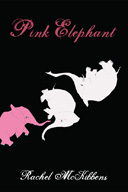Rachel McKibbens, 'Pink Elephant' (Cypher Books, 2009)

Rachel McKibbens's lovely and serrated debut collection, Pink Elephant (Cypher Books), reminds us why poetry as testimony is so necessary. Ex-punk rock chola and mother of five, 2009 Women’s Individual World Poetry Slam champion Rachel McKibbens writes about abandonment and abuse in stark, startling language and well-wrought fable, delivered in well-paced lines, laying bare the history of a woman who's "fed [her] body to the hungry for years."
In "The First Time," the speaker and her little brother run away:
...we filled a shopping bag full of toys,
spoons and a jar of peanut butterclimbed the wall behind our apartment complex
and walked along the train tracks,
where we had sacrificed handfuls of pennies
and misbehaved dolls.I was six years old, wearing a nightgown
In hindsight, her speaker concludes that "the maggots in the kitchen sink, / mother passed out on the porch," that home life which she and her brother flee, is what truly belongs to them. McKibbens's poems give us substance and not therapy. She reveals the learned and practical codes of behavior which enable the children to get by. In "Doggie Bag Etiquette (Stepmother 101)," the children listen to dad and stepmom through the bedroom door, and learn about their father's love. "But if there was screaming, the crash of a body, / then silence -- the phones were ripped out of the walls and we became // his children again. And the three of us would take off...."
McKibbens does not romanticize victimhood; she simply means to show us how unchecked violence reproduces itself. Her tone is matter-of-fact, and the scenes she writes are unflinching. "Tomboy," reads as fable of internalized misogyny, in which her speaker captures a mermaid, who is the mythic idealized woman. She speaks "a wild ocean language I could not comprehend." The mermaid’s inability to be understood causes the speaker to enact the learned behavior of belittling and inflicting pain. "I stood over her, disgusted. Smashed a mirror against her breasts / then sucked the final splinters of moisture from her lips." In "The Day After the First Time We Ran Away From Home," we see the brother enact a learned behavior upon the neighbor's turtle. He has lured it into his yard with piece of lettuce. Once the lettuce has run out, once the brother has nothing left to offer it such that it starts to leave, the brother’s rage is switched on. He kicks and cracks the turtle; "by then / there was no going back, so he sprayed / the turtle's head with Raid / and wrapped it in up a bath towel / and threw it into the garbage bin...."
There is a difference between running away, and bringing the abuse to an end by confronting it. Something else can begin only after a previous thing ends. In "The Last Time," alone, her speaker uses the father’s tool, "the hammer / with his initials burned deep / into the handle" against him.
... he stared
only at the weapon in my hand
and I looked at him and said,
If you ever touch us again,
I will kill you.
And then he saw me.
Okay, he said.
Okay.
In "Cardinal" and other poems, her speaker appears split in two, as if she is becoming acquainted with the grown-up she is becoming:
When I stole your lover, you cut your arms.
Moved to a different town. Got raped and pregnant.[...]
You're a mother now. You whisper into the phone.
Your boyfriend comes home late and drunk all the time.
You want to get out. You want a better life for your baby.
You named him after your father.
We see this progression from the abused young woman into the fierce mother protecting her newborn:
...The moment he was
born, you learned how to love him. You held him in your arms.
Fed him worms from your mouth. When the nurse came
to take him, you pecked a hole in her hand.
In "Drift," "the ocean keeps damaged women afloat, / breaks us from concrete blocks and alibis." Recall the abused mermaid from her speaker's childhood in "Tomboy." As a mother, the speaker has since opened herself up to something the mermaid was supposed to teach her about women and love. Part Hansel and Gretel, "What Comes Next" tells us that while the past of protecting herself and her brother from a "world that would do nothing to protect them," is always with her, it also propels her forward, asking her "What will you do now? … When?" If there is any resolution to be had in Pink Elephant, it is in her realization of the difference between mothers and women in "The Pacifier," and which one she know she wants to be.
Ultimately, this collection, and McKibbens's apparent concern with chronicling meticulously the beginning, the first time, what happens next, the last time, how it ends, illuminates for us how the process of survival, which she has taken into her own hands, is a lifelong, ugly, and non-miraculous one.
--
Listen to Rachel McKibbens at The Blood-Jet Writing Hour.
Read an interview at the Letras Latinas blog.
Barbara Jane Reyes was born in Manila, the Philippines, and grew up in the San Francisco Bay area. She...
Read Full Biography

